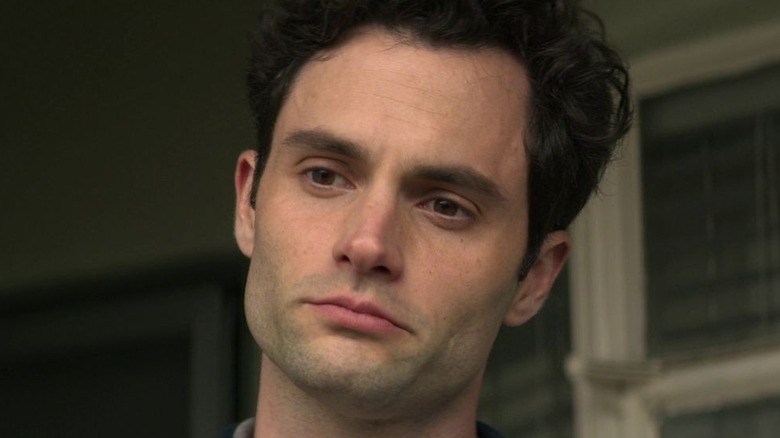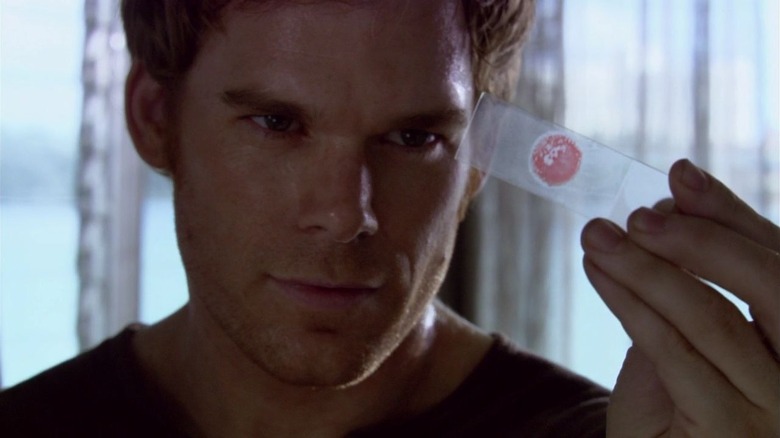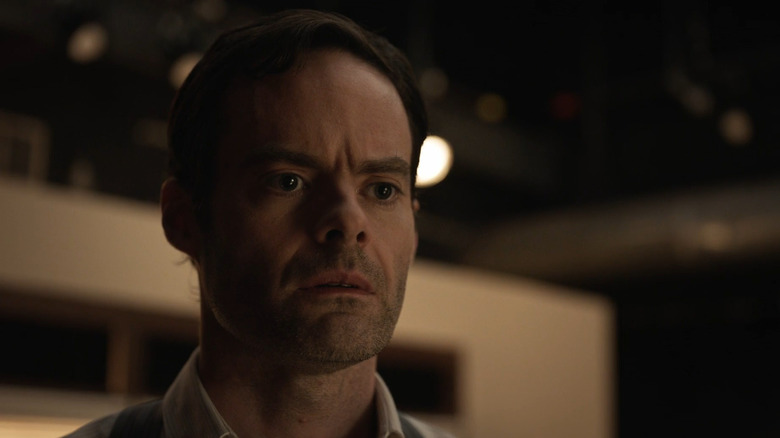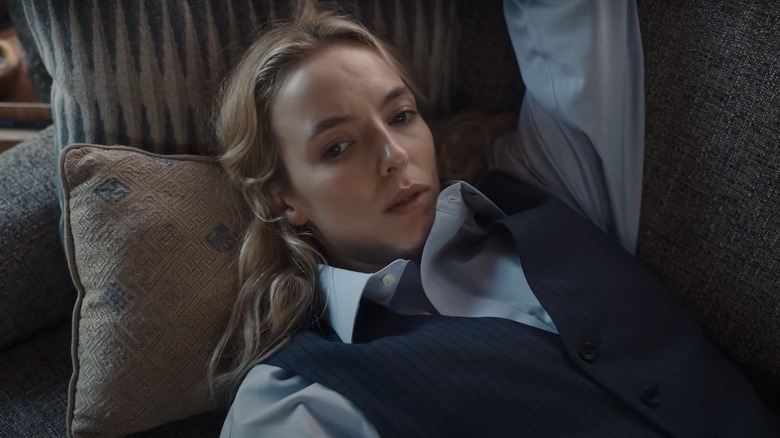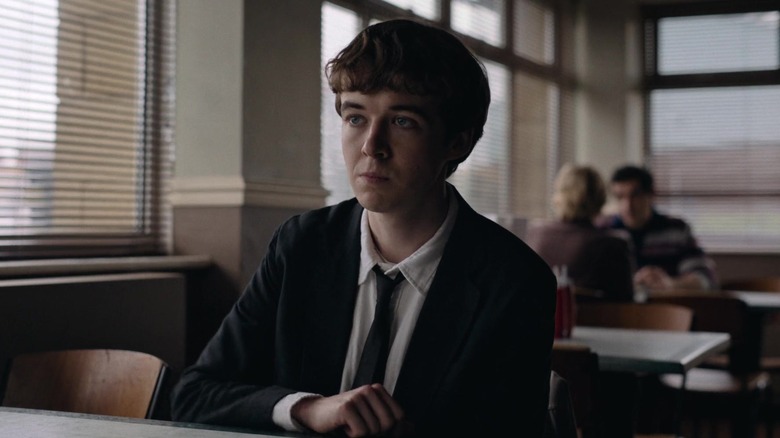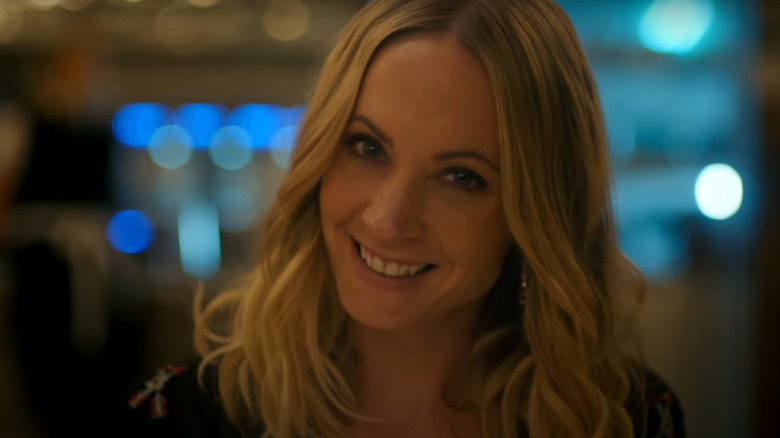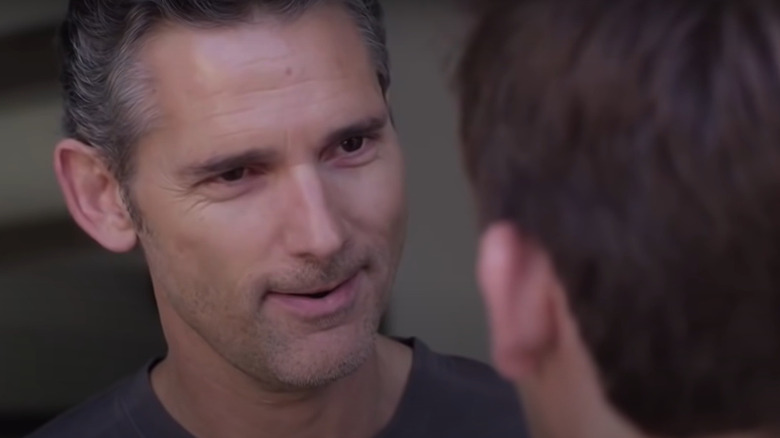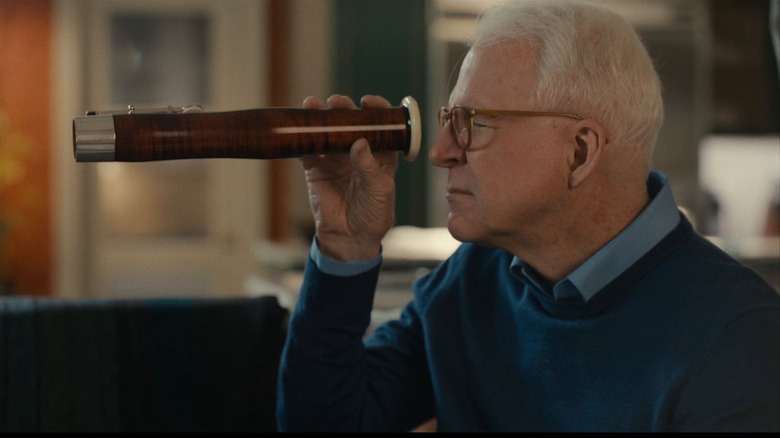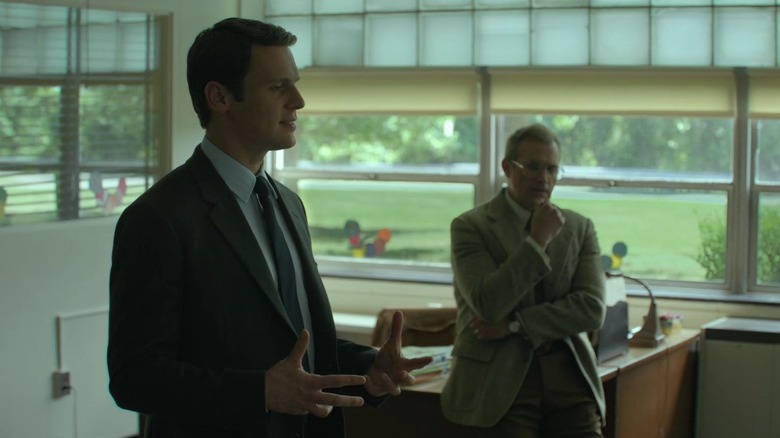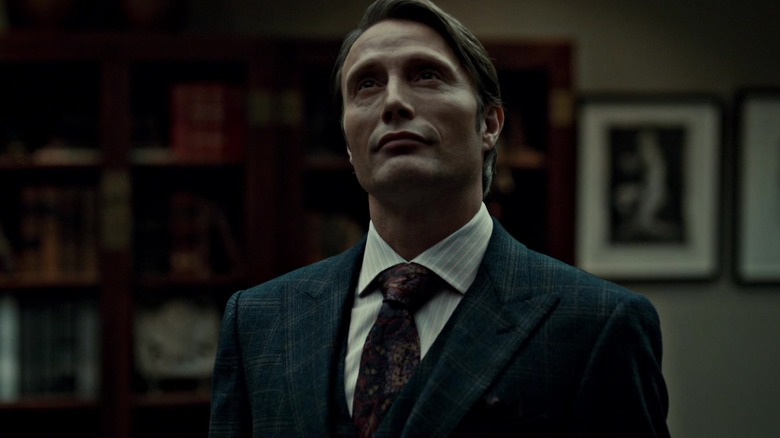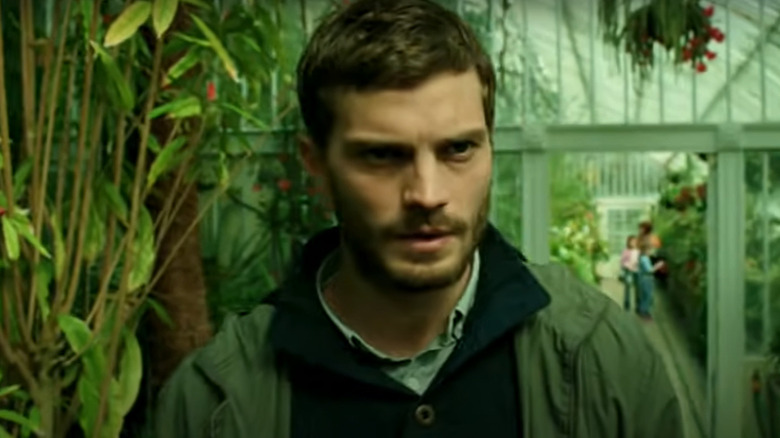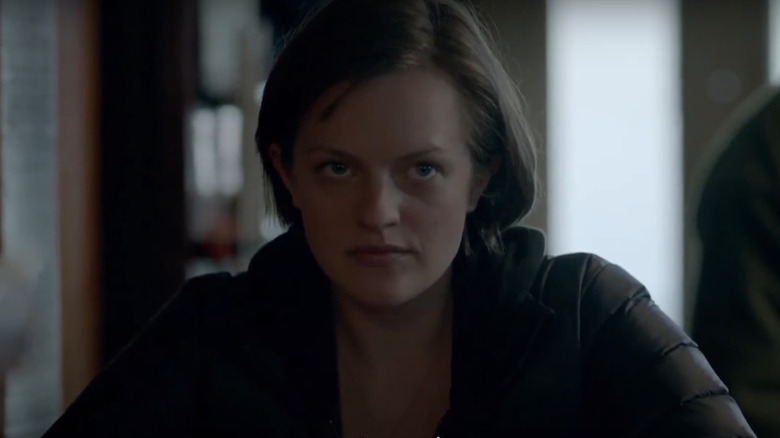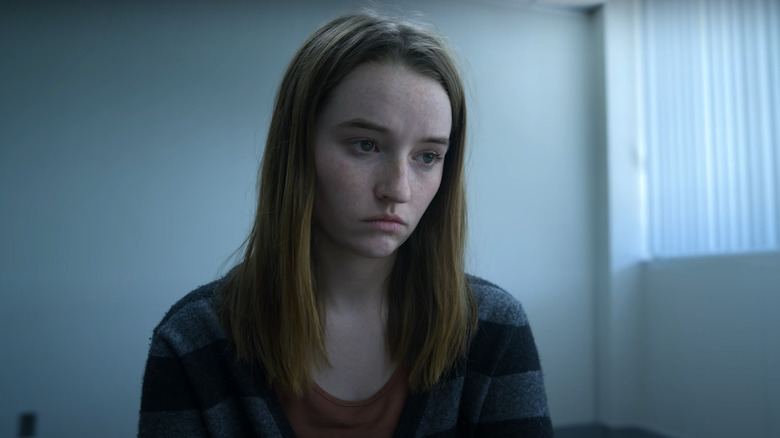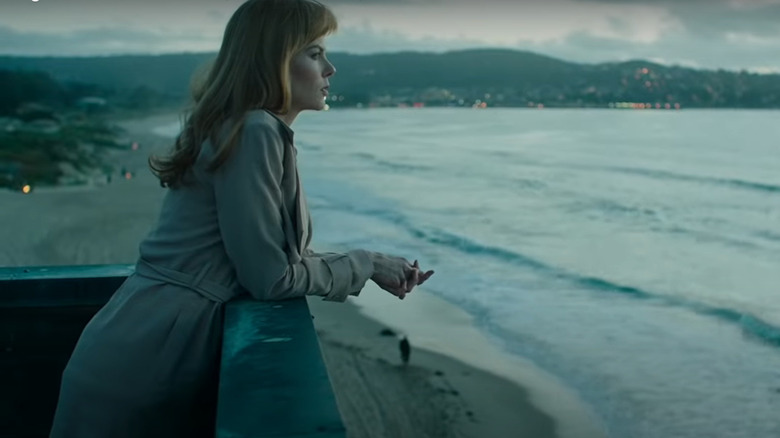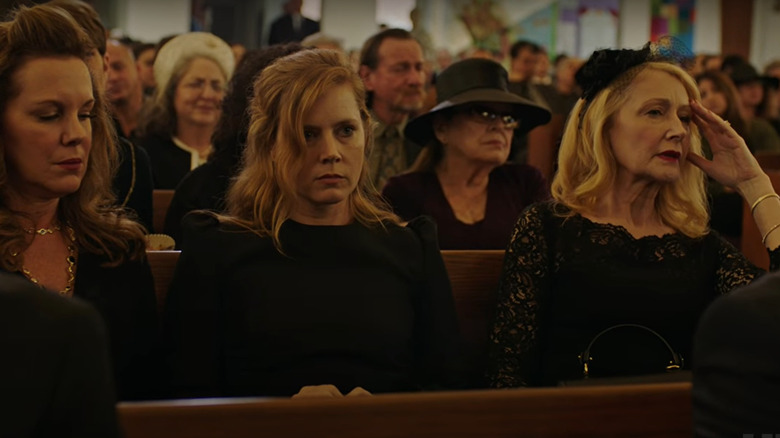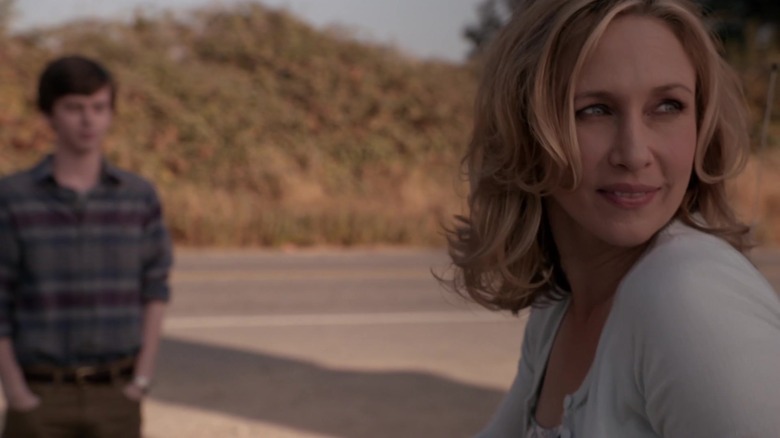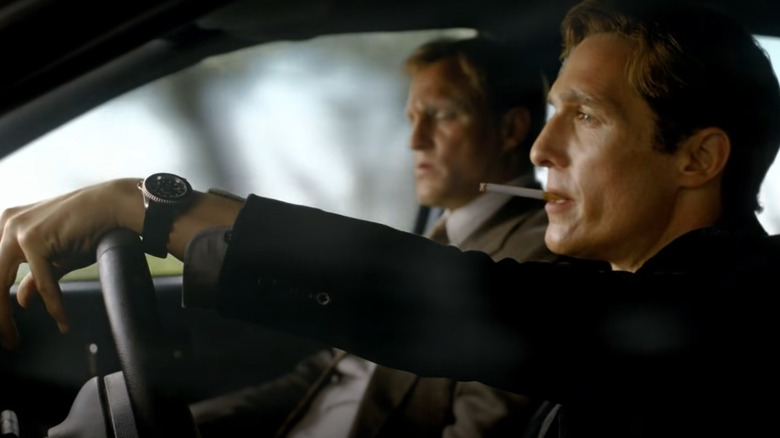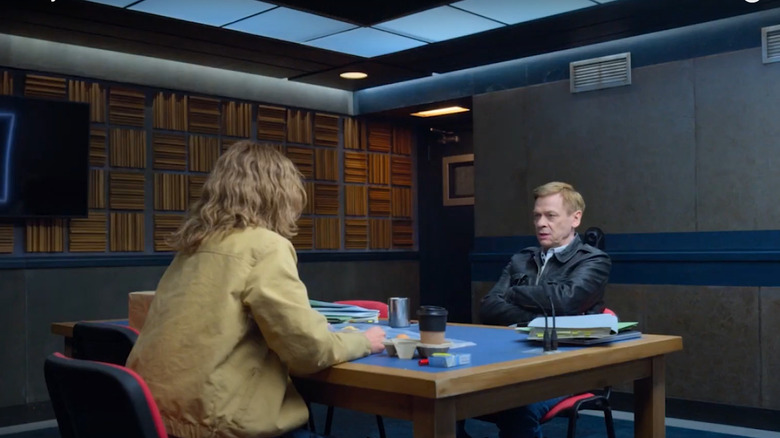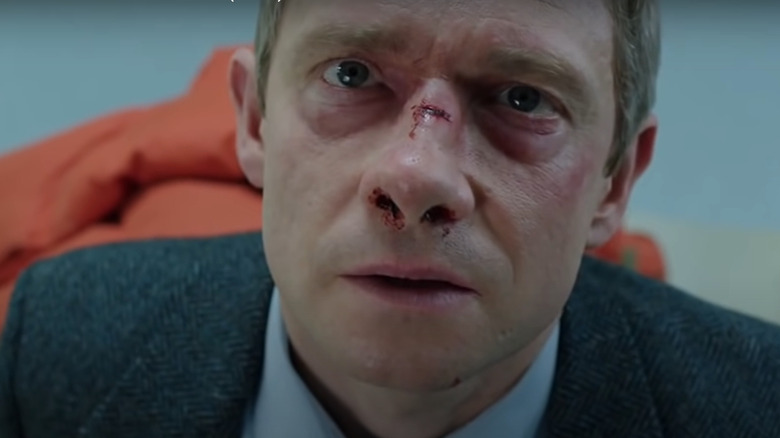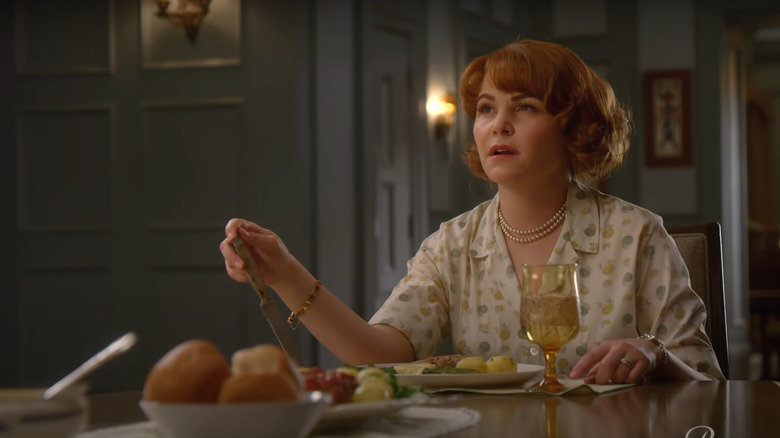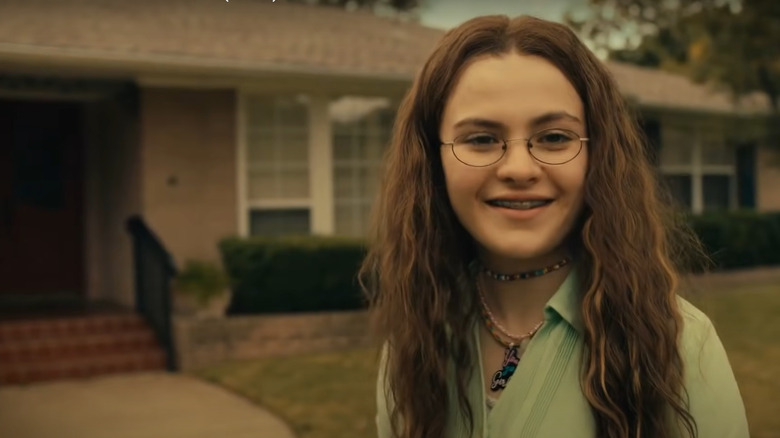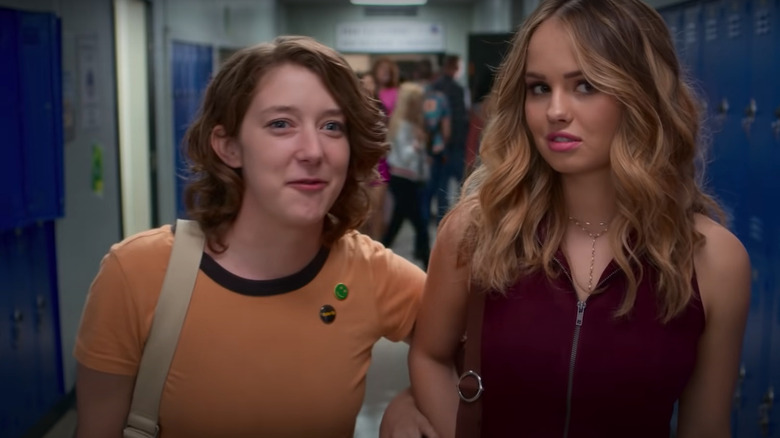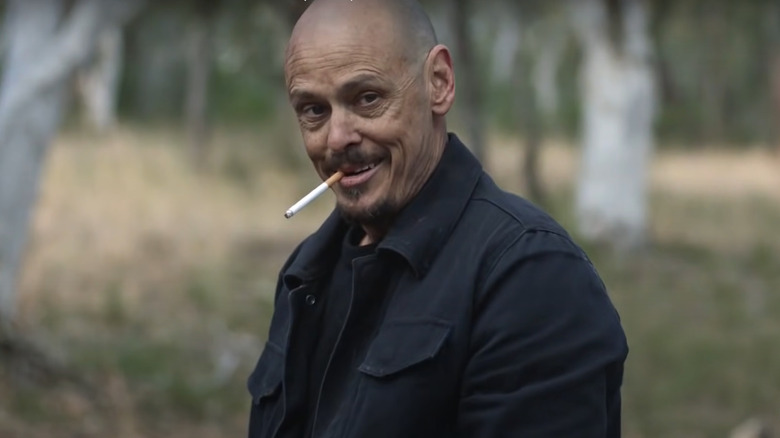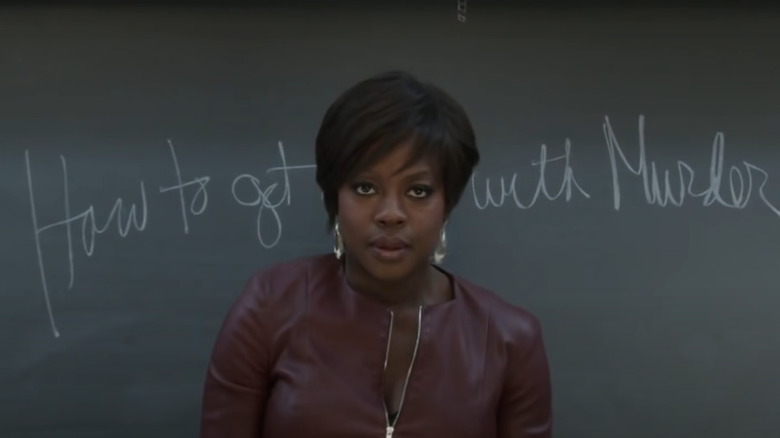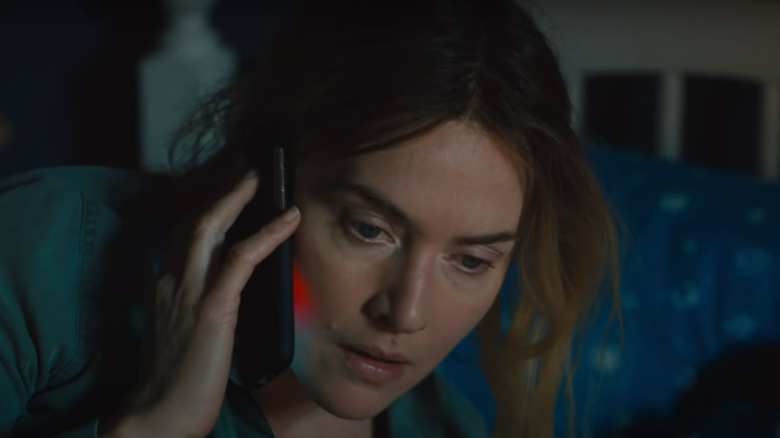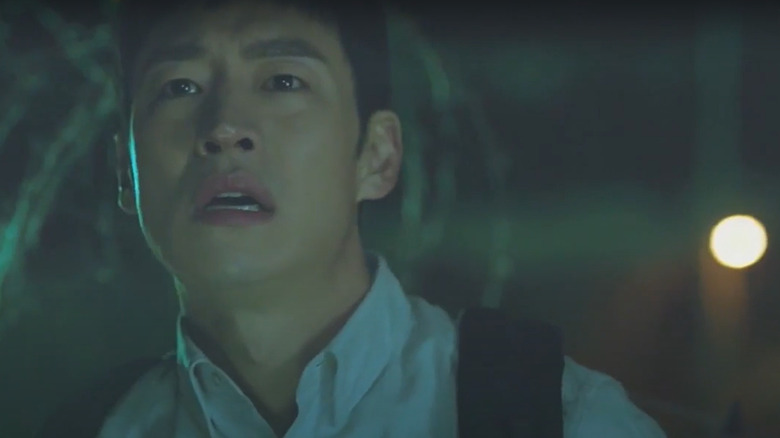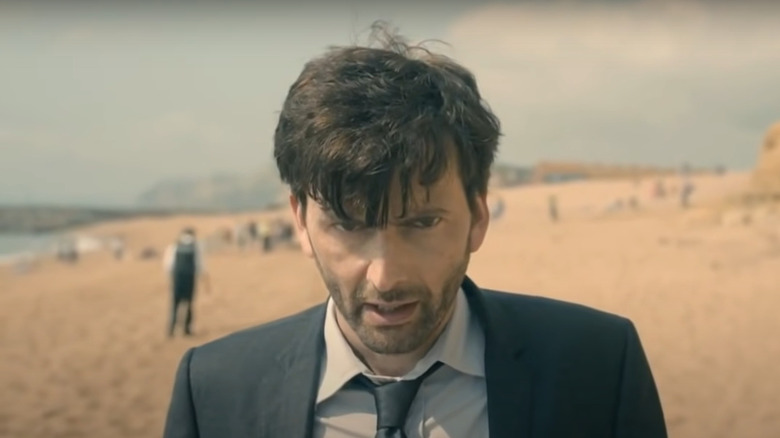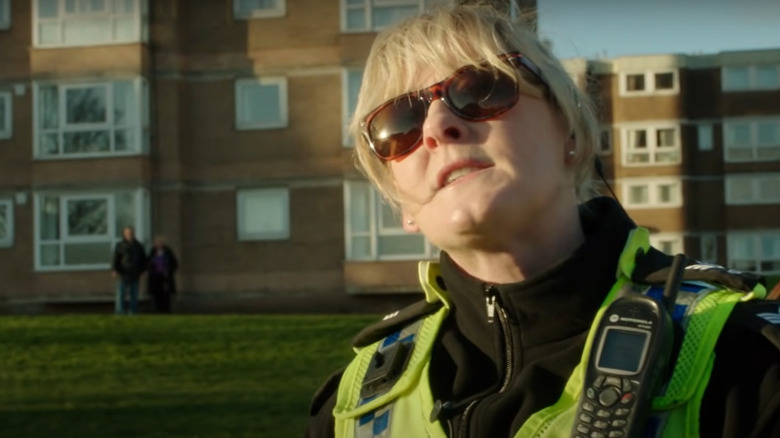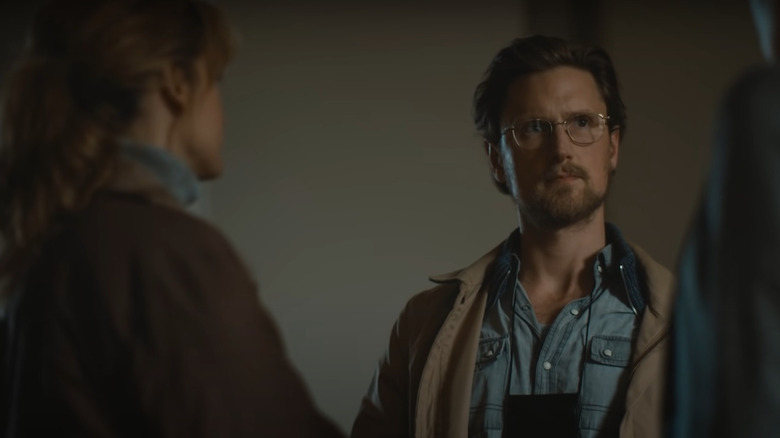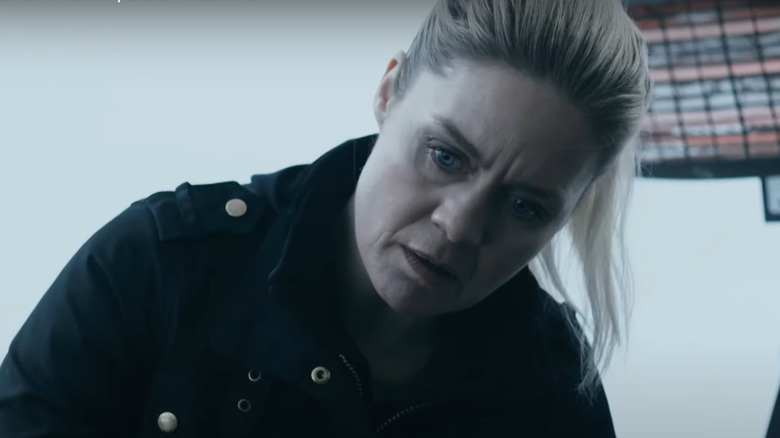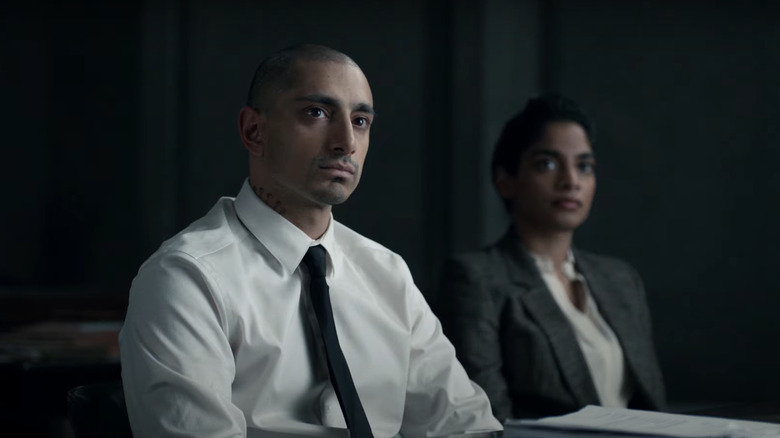30 Shows Like You That Are Worth Your Time
"You" tells the story of bookstore manager Joe Goldberg (Penn Badgley), who, at first glance, appears to be a true catch. He's charm personified, well-read in every sense of the word, and just wants to find "the one" to experience life with. The only catch: He has something of a murder habit, and he just can't seem to kick it. "You" showcases his infatuation (read: obsession) with three different women over the course of three seasons: Guinevere Beck (Elizabeth Lail), whom he kills soon after she learns he murdered her friends; Love Quinn (Victoria Pedretti), who turns out to be a killer just like him; and Marienne Bellamy (Tati Gabrielle), who is neither a murderer nor Joe's victim ... yet.
Viewers who love the twisted melodrama of "You" might not think there are any other shows out there that bring its signature blend of emotional intensity and high-octane thrills. But in fact, any of the 30 shows on this list are worth any "You" fan's time. From British mysteries to campy thrillers, these are the shows viewers hungry for more "You"-style mayhem should check out.
Dexter
Apart from Joe, only one other name instantly springs to mind when you think of TV's most infamous serial killers: Dexter Morgan of "Dexter." One might even say that Dexter (Michael C. Hall) was the Joe Goldberg of the '00s. In the show's heyday, viewers were just as obsessed with this forensic expert who acts as judge, jury, and executioner to criminals who slip through the cracks of Miami law enforcement.
The most distinctive difference between the two is that Dexter applies a moral precept to determine his next murder victim, while Joe kills on impulse. Still, both serial killers use warped logic to justify their killings. Joe pins the blame on his passionate love affairs — even while his real passion seems to lie in murder. Dexter, on the other hand, uses vigilantism to rationalize his obsession with killing. Clearly, "You" fans will find another like-minded anti-hero in "Dexter."
Barry
Even the most shocking scenes in "You" show more than a few traces of dark humor. Remember Joe confidently declaring Peach Salinger (Shay Mitchell) to be the crazy, unhinged stalker in Beck's life right before he attempts to murder her? This unique alchemy of shock and comedy is also found in the Emmy Award-winning "Barry," which follows an apathetic hitman who has a sudden change of heart.
On an assassination mission, Barry (Bill Hader) finds himself part of a theatre troupe. In the process, he discovers that acting allows him an emotional release far better than murdering people in cold blood. Soon, he's introducing himself as an actor and running lines with his eccentric-but-lovable co-stars. But Barry still has to outrun his chaotic past and become someone else — not only on stage, but in real life too.
Killing Eve
Joe would find a kindred spirit in Villanelle (Jodie Comer), the elusive assassin of "Killing Eve," who murders for an enigmatic board of puppet masters known as the Twelve. "Killing Eve" acutely captures the essence of being a psychopath: It's boring. Villanelle turns to extreme acts like murder just to feel something. In the expert assassin's own words, "Most of the time, most days, I feel nothing." But even the unfeeling Villanelle has a weakness: Like Joe, she's prone to developing obsessions. This time, the object of her fascination is an M16 agent named Eve Polastri (Sandra Oh), who will stop at nothing to bring her down.
Eve is driven to pursue the case by her own unhealthy obsession with Villanelle. In hunting her, she simultaneously becomes Villanelle's most formidable adversary, and the sole person who can truly empathize with her. This is incredibly entertaining, and eerily reminiscent of the relationship between Love and Joe.
The End of the F***ing World
While Joe is what one could call an "established" psychopath, James (Alex Lawther), the teenage protagonist of "The End of the F***ing World," is more of a wannabe. To complete his rite of passage into full-fledged cruelty, James befriends his seemingly naïve classmate Alyssa (Jessica Barden) and plots to murder her. But his plan starts to go awry when Alyssa's arrival triggers an outpouring of emotions.
This show uses villainy as a metaphor for the teenage experience: One goes from living a relatively bland, apathetic life to suddenly experiencing a full spectrum of emotions. That's not to say that "The End of the F***ing World" doesn't contain actual murder, though — it has more than its fair share of it. As James and Alyssa embark on a Bonnie and Clyde-style adventure across the country, they experience everything from crashing their car in a lust-fueled daze to perpetrating blackmail, and, finally, committing murder.
Liar
Watching Joe suddenly and irrevocably transform from a guy with a harmless crush to something much more sinister can send you into a state of cognitive dissonance. "Liar" recreates this experience when it shows us a suave, charming doctor named Andrew Earlham (Ioan Gruffudd), then drops the bombshell that he may be a sexual predator. It all starts when school teacher Laura Nielson (Joanne Froggatt) has a meet-cute with Andrew and agrees to a dinner date. The date proceeds like something out of a romantic movie — until the morning after, when a foggy Laura awakens and accuses Andrew of rape.
Compared to the easy, twisty fun of a show like "You," "Liar" is not an effortless watch. The show is an exercise in understanding where your allegiances lie. Until the so-called liar is outed in the final episodes, you're forced to rely on your own moral compass, and in the process, confront your own biases about a subject as sensitive as sexual assault.
If you or anyone you know has been a victim of sexual assault, help is available. Visit the Rape, Abuse & Incest National Network website or contact RAINN's National Helpline at 1-800-656-HOPE (4673).
Dirty John
Real-life stories of grifters often make for delicious popcorn entertainment. Netflix has practically carved out an entire programming wing for such tales, including "The Tinder Swindler," "Inventing Anna," and "Bad Vegan." But like "You," "Dirty John" was well ahead of this curve. Released all the way back in 2018, Season 1 of this anthology show is based on a popular true crime podcast of the same name. Season 2 tells the real-life story of Betty Broderick and her nightmare of a marriage to John Broderick. The fact that both stories are adapted from very real sources makes them that much more terrifying
"Think Joe from 'You,' but older": That's how Netflix describes the titular John Meehan (Eric Bana) from Season 1 of "Dirty John." They're not wrong. With his dapper looks, witty repartee, and endless supply of charm, John could woo a stone statue. It's hardly surprising, then, that the well-to-do Debra Newell (Connie Britton) falls for him so quickly and vigorously, despite protests from her children. She's soon in for a rude awakening.
Only Murders in the Building
"Only Murders in the Building" is a well and true romp, much like "You." What else could you expect from a show that stars Steve Martin, Martin Short, and Selena Gomez?
Crime aficionados will especially lap "Only Murders in the Building" up, because it revolves around a group of people exactly like them. Charles-Haden Savage (Martin), Oliver Putnam (Short), and Mabel Mora (Gomez) are card-carrying true crime fans who find their encyclopedic knowledge of the subject put to the test when a murder takes place in the Arconia, their own building. So, the trio does what anyone in their position would: They start an investigative podcast called ... you guessed it, "Only Murders in the Building." If Joe happened to live at the Arconia, his many escapades would be great fodder for the trio's podcast. In a perfect universe somewhere out there, that crossover is definitely happening.
Mindhunter
"You" takes you inside the mind of a psychopath, providing insight into Joe's flawed moral logic. "Mindhunter" shows you all of that, times a hundred. Serial killers aren't vestiges of the past just yet, but the period between 1970 to 2000 has been called their heyday by outlets like Rolling Stone. But as serial killing took flight, so did the field of criminal psychology. "Mindhunter" begins right in the throes of this era, when FBI agents Holden Ford (Jonathan Groff) and Bill Tench (Holt McCallany) resolve to probe the psychological makeup of the most notorious serial killers in existence.
Holden and Bill embark on a tour of the country's most dangerous (captured) murderers and relentlessly pick their devious brains. Bear in mind, the very idea of the serial killer was next to non-existent at the time. This is the story of how that concept emerged — and the ensuing process to understand and define it.
Hannibal
In the TV serial killer hall of fame, you'd find the infamous cannibal Hannibal Lecter (Mads Mikkelsen) of "Hannibal" fame right alongside Joe. "You" may offer a feast of blood and gore, but "Hannibal" spares no grisly detail in its storytelling. In this adaptation of Thomas Harris' novels, Hannibal teams up with FBI agent Will Graham (Hugh Dancy) to nab the most daunting serial killers, all while murdering people and carving them up for dinner himself.
That vivid premise isn't the only reason "Hannibal" should be next on your watch list after "You." Before gracing our TV screens, Hannibal Lecter was best known as the terrifying monster of "The Silence of the Lambs." As she revealed to Interview, "You" series author Caroline Kepnes drew heavy inspiration from this film when sketching out the plot of one of the books. The notorious cannibal has left his mark in many places, and "You" is not an exception.
The Fall
Joe may look the part of the average Joe (pun intended), but he's quite the expert at leading a double life. He expertly plays the role of the perfect boyfriend while simultaneously murdering anyone who dares to get in the way of it. In "The Fall," all the way across the pond in Belfast, everyman Paul Spector (Jamie Dornan) is in much the same situation. At home, he's a doting father and loving husband. Elsewhere, he hunts and murders women for sport. Hot on his trail is detective Stella Gibson (Gillian Anderson), who engages him in an elaborate game of cat and mouse.
Despite being a serial killer thriller, "The Fall" cleverly subverts the typical tropes of the whodunit. Instead, it derives most of its thrills from Stella examining Paul's twisted, two-faced psyche and attempting to reconcile his mundane life with his disturbing activities.
Top of the Lake
Before Jane Campion won an Oscar for "The Power of the Dog," she won critical acclaim for her series "Top of the Lake." In the oddball New Zealand town of Laketop, 12-year-old Tui Mitcham (Jacqueline Joe) becomes pregnant, and, soon after, vanishes altogether. It falls to child protection specialist and temporary Laketop resident Detective Robin Griffin (Elisabeth Moss) to investigate both her pregnancy and her disappearance. Merely calling "Top of the Lake" a detective show is reductive — it would be better described as a fever dream about a lost girl in a strange and unwelcome land. Campion even frames most of the show against dream-like portraits of the harsh but beautiful New Zealand terrain.
Robin has her work cut out for her in Laketop: Decades-long wounds of misogyny have festered into a culture of rape and sexual assault. To get to the bottom of Tui's disappearance, Robin must contend with these ugly forces, which she does squarely and resolutely. If Robin Griffin were on the trail of Joe Goldberg, we get the sense that he wouldn't stand a chance. It might just take a Robin to nab a Joe.
Unbelievable
Season 2 of "You" achieves the pinnacle of irony when it depicts a serial killer like Joe finally meting out justice to a serial sexual offender like Joshua "Henderson" Bunter (Chris D'Elia), whose penchant for young girls is an open secret. The Netflix miniseries "Unbelievable" has similar layers of irony to it. The truly unbelievable part of the show is just how little belief the justice system places in survivors of sexual assault who take the painful step of coming forward.
When Marie Adler (Kaitlyn Dever) is raped by an unknown assailant, she goes to her local police precinct, only to be gaslighted by male officers into retracting her allegations. Some years later, a pair of female detectives investigate a string of similar assaults that could prove Marie was telling the truth. "Unbelievable" could have easily veered off track — such is the sensitive nature of the subject — but the nuance and thought it applies to depicting its complex and painful story won it immense praise.
Big Little Lies
Monterey, California, where much of "Big Little Lies" takes place, is deceptively idyllic. This town is essentially to "Big Little Lies" what Madre Linda is to "You": A small place with big secrets. Both places are the very definition of moneyed suburbia, rich with scenic views and populated with deep-pocketed entrepreneurs, fitness freaks, and spunky moms. These residents are constantly posturing to each other and acting as though this frantic keeping-up-with-the-Joneses is not a choice, but a way of life.
This is all disrupted by the arrival of two newcomers: young, down-to-earth mom Jane Chapman (Shailene Woodley) and her son Ziggy (Iain Armitage). Jane comes bearing a secret that could very well erode Monterey's tenuous peace and quiet. She insulates herself within a posse of Monterey women who conceal their own share of secrets — especially Madeline Mackenzie (Reese Witherspoon) and Celeste Wright (Nicole Kidman). After a shocking murder occurs, their secrets become a shared burden ... but what, exactly, have they done? Finding out is an explosive thrill ride.
Sharp Objects
Only a brutal mind like Joe's is capable of terrorizing a small town into near collapse. This is precisely what transpires in "Sharp Objects," which makes the small, moody town of Wind Gap into the object of our horror and fascination. Journalist Camille Preaker (Amy Adams), a prodigal daughter of Wind Gap, moves back to town to cover a series of child killings. She immediately finds herself nursing old wounds and, often as a result, a glass (or two) of liquor. Meanwhile, Amma Crellin (Eliza Scanlen), Camille's teenage half-sister, is the very picture of grace and poise (at home, anyway), which Camille's domineering mother Adora (Patricia Clarkson) won't let her forget.
In a way, "Sharp Objects" could be called a family drama as much as it is a murder mystery. But as the series goes on, those lines become more and more blurred. Wind Gap's sorrows are complex and bloody — and a whole lot closer to home than most of the populace would like to admit.
If you or anyone you know is struggling with addiction issues, help is available. Visit the Substance Abuse and Mental Health Services Administration website or contact SAMHSA's National Helpline at 1-800-662-HELP (4357).
Bates Motel
If you think Joe's wildly dysfunctional relationship with his mother is as bad as parental conflict can go, wait until you've met Norman Bates (Freddie Highmore). You've probably watched, or at the very least heard of, Alfred Hitchcock's Norman Bates, the titular madman of "Psycho." "Bates Motel" tells the story of how Norman Bates transformed from a tame high-schooler into a ruthless serial killer, and how his mother Norma (Vera Farmiga) changed from a lively motel owner to a pickled dead body. Despite the show's conclusion being known to most of mankind, "Bates Motel" manages to keep the tension high and the suspense palpable.
After the Bates patriarch suddenly dies, Norman and Norma start life anew by buying a motel in Oregon's White Pine Bay. The town appears to mirror its newest residents' dysfunctionality, in equal if not larger amounts. Among White Pine Bay's troubled denizens, Norman and Norma attempt to bring the rundown motel to life. What actually happens to them is a whole lot darker.
True Detective
While Season 2 didn't earn the same praise, Season 1 of "True Detective" boasts a self-contained mystery that truly merits its enormous acclaim. Between ruminations on the nature of existence and the meaning of being, detectives Rustin "Rust" Cohle (Matthew McConaughey) and Martin "Marty" Hart (Woody Harrelson) probe a series of chilling murders in Louisana's backwaters. The series jumps between different time periods, etching out a comprehensive timeline of this bloody mystery from the moment it begins to when it finally concludes, decades later.
As the case evolves over the years, so do the two detectives. Rust in particular goes from being a pessimist to ... being an even bigger pessimist. Rust and Joe might be on opposite sides of the justice system, but they share a common nihilism about the state of the world, which they convey in hyperliterate and cynical monologues. These are major highlights of both shows.
Criminal: Germany
The police procedural has traditionally been an action-packed genre, full of high-speed chases, combat sequences, and shootouts. The "Criminal" series eschews all of that for a simple interrogation room. In each self-contained episode, a new suspect enters the room and a group of expert investigators attempts to eke out a confession from them. Just as the suspect is confined to the claustrophobic interior of a windowless room inside a police precinct, so are we.
The "Criminal" franchise has four different, unconnected installments, each set in a different country. The German series is especially good, particularly due to the way it frames interpersonal crimes within the larger context of its political and social climate. Its stellar team of interrogators, headed up by Nadine Keller (Eva Meckbach), attempts to fill in the gaps between what's said in the room and what little they know about the suspect. If you're especially captivated by Joe's expert mind games in "You," you'll find the psychological warfare on display in "Criminal: Germany" highly interesting.
Fargo
Modeling a whole series after one of the most well-known and beloved Coen brothers movies could have ended in disaster. But the creators of TV's "Fargo" boast such mastery of technique and reserves of sheer ingenuity, what results is absolutely exceptional.
Much like "You" begins every season in a new town, then molds its characters and storylines to suit the milieu, so too does "Fargo." An anthology series, "Fargo" centers each season around a different crime committed somewhere in the Midwest. Though the plots and characters vary by season, the show's main motifs recur in each: Gullible main characters, money-making schemes destined to go horribly wrong, and slightly underestimated but morally sound cops are omnipresent. All these elements blend together to become a TV show completely worthy of the praise its film received.
Why Women Kill
If you particularly enjoy Love taking matters into her own hands and giving Joe a taste of his own medicine, "Why Women Kill" is right up your alley. This campy saga spans three different decades, with each decade featuring a couple enduring no small amount of marital trouble. Apart from these stresses, the three couples are connected by a house each has lived in.
In the '60s, housewife Beth Ann Stanton (Ginnifer Goodwin) moves into said home and almost instantaneously unearths an ugly truth: Her husband has been two-timing her. Two decades later, socialite Simone Grove (Lucy Liu) discovers her husband is a closeted gay man who has cheated on her with other men. Meanwhile, in 2019, married couple Eli Cohen (Reid Scott) and Taylor Harding (Kirby Howell-Baptiste) seem content to be in an open relationship, until a new entrant threatens their loyalty to each other. The infidelity, aggression, and outright contempt the women of this show are subjected to inevitably boil over into violence. "Why Women Kill" is the story of this catharsis.
Cruel Summer
"Cruel Summer" might appear to be another soapy show about high school cliques and teenage rivalries. But that's just scratching the surface of a much more intricate story. For one thing, it may or may not contain a teenager who stands alongside the most terrifying maniacs on this list.
The teen in question, mild-mannered Jeanette Turner (Chiara Aurelia), is accused of a strange crime: doing nothing. This crime is said to have taken place sometime after the queen bee of Skylin, Texas, Kate Wallis (Olivia Holt), was abducted. Overnight, Jeanette takes her place as the most popular teen in town. Her popularity is short-lived, though, because Kate is found and released from captivity just as suddenly as she disappeared. Soon after, Kate publicly accuses Jeanette of knowing her whereabouts, yet doing nothing to alert the police. Is a supposedly meek teenager such as Jeanette capable of such malice? And if so — why?
Insatiable
Georgia high schooler Patty Bladell (Debby Ryan) is overweight and underconfident. This has made her an outcast at school — her only social function is to be the butt of everyone's jokes. The answer to her problems presents itself in the form of a sock to the jaw: After having her jaw wired shut for months, Patty sheds more than a few pounds. Upon returning to high school, her first order of business is to get a makeover from pageant coach Bob Armstrong (Dallas Roberts). Her second is to seek revenge.
This show may have received a tepid response from most critics, but some were quick to jump to its defense. Slate, for instance, theorized that the show's flair for the theatrical is simply an acquired taste. And indeed, "Insatiable" stays true to its themes of excess by indulging in the most over-the-top scenarios and wildest character arcs possible for its equally dramatic heroine. If a camp Joe Goldberg existed, he'd basically be Patty Bladell.
Mr. Inbetween
Ray Shoesmith (Scott Ryan) of "Mr. Inbetween" is a hitman forced to attend anger management sessions, because being an ice-cold murderer has left him prone to flying off the handle. It doesn't take much for him to blow a fuse, and anyone at the receiving end of his temper — intended victim or otherwise — is not a happy camper.
As we discover, anger is the only feeling Ray seems to know how to emote. When this is established, his therapy sessions begin to provide us with comedy gold, as well as enable necessary insight into his mind. Ray and Joe are both proponents of the same inane philosophy towards violence: It can be a force for good when dealing with society's most meddlesome participants. While this may cause Joe to go off the deep end, there may yet be time for Ray to change.
How to Get Away with Murder
"How to Get Away with Murder" has a distinctly pulpy quality that fans of "You" will surely appreciate. Like "You," this thrilling series offers a plethora of knuckle-biting twists and turns, with the added benefit of having a strong and enigmatic female lead.
Law professor and practicing attorney Annalise Keating (Viola Davis) is renowned for her work — so much so that competition for a coveted set of internships at her firm could lead to murder itself. Five lucky students — Wes Gibbins (Alfred Enoch), Michaela Pratt (Aja Naomi King), Connor Walsh (Jack Falahee), Laurel Castillo (Karla Souza), and Asher Millstone (Matt McGorry) — land these internships, marking the first of a long line of collaborations (and collusions) between them and Annalise. The "Keating Five," as these students come to be dubbed, not only solve and try cases of murder alongside Annalise — they eventually end up committing the deed themselves.
Mare of Easttown
Viewers spend a good portion of "You" attempting to deduce how a seemingly harmless infatuation snowballs into murder. "Mare of Easttown" also does this, but in reverse order. In quiet Easttown, Pennsylvania, where teen pregnancy could be considered an epidemic, teen mom Erin McMenamin (Cailee Spaeny) is found dead. One detective sets out to untangle a messy web of fixations and obsessions in order to find the culprit.
The detective in question, Marianne "Mare" Sheehan (Kate Winslet), has endured tragedies of her own. She funnels her unresolved grief into investigating and avenging Erin's murder, even as she raises her grandson and attempts to guide her teenage daughter. In many ways, the show follows Mare as she performs an exorcism of her personal demons. But it's also about the hunt for those evils that terrorize her beloved town — evils that turn out to be a lot more complex than Mare ever could have guessed.
Signal
A walkie-talkie connects past to present and two unsuspecting people from different eras. This may sound like the start of a mind-bending sci-fi show, but "Signal" is far from that. In truth, this South Korean series is a police procedural that uses the discovery of a time-defying radio signal to unravel mysteries that have remained unsolved for decades. Turns out, having insight into the past and present at the same time can make even the most confounding cases solvable.
The source of the signal is less of a subject of conversation than the good that can be done with it. Eventually, criminal profiler Park Hae-young (Lee Je-hoon), who first discovers the walkie-talkie, teams up with experienced detective Cha Soo-hyun (Kim Hye-soo) to form a team dedicated to communicating with the past and puzzling out such cold cases. "You" may have plenty of murder and mystery, but the one thing it lacks is a penchant for the fantastical. "Signal" happens to link together all three elements.
Broadchurch
Mega-star Olivia Colman may have been a British treasure for years, but "Broadchurch," which stands out as one of the best British TV shows of the last few decades, put her on the global map. The quaint Dorset town of Broadchurch has its own share of Joe Goldbergs, and even more secrets concealed beneath its beautiful beaches. Colman's Detective Sergeant Ellie Miller and her world-weary partner, Detective Inspector Alec Hardy (David Tennant), bring them to justice.
Season 1 and 2 of "Broadchuch" deal with the gruesome murder of a young boy named Danny, while Season 3 deals with a serial rapist on the loose. This series is as much about these criminals and their gory crimes as it is about the ripple effects they have on a tight-knit community. In this small town, the grief of losing a loved one or enduring a traumatic experience is a communal one. But this intimacy also has its downsides: Suspicion and doubt spread like wildfire, and soon, everyone starts to become a suspect.
Happy Valley
Don't let the show's title fool you — this murder mystery is certainly not named for its cheerfulness. In England's Calder Valley, Sgt. Catherine Cawood (Sarah Lancashire) has two distinct problems on her hands. Firstly, the daughter of a prominent businessman has been kidnapped. Secondly, Tommy Lee Royce (James Norton), who raped Catherine's late daughter, has been paroled and now roams the streets as a free man.
Tommy Lee is a villain very worthy of comparison to Joe. He may lack Joe's characteristic charm and poise, but he more than makes up for it with copious amounts of vanity and narcissism. Unbeknownst to Catherine, Tommy's reentry into society and the ongoing kidnapping case will collide in a shocking and catastrophic way.
The Chestnut Man
Any list of crime and detective shows needs to include at least one representative of Scandinavian noir. Ours is "The Chestnut Man." Perhaps what makes this Danish series so deliciously twisty is that it bears all the signature elements of its subgenre: hauntingly striking landscapes, an ambiance of palpable dread, and jarring realism. The chilling precision with which the show's serial killer, the Chestnut Man, identifies, stalks, hunts, and attacks his victims makes even Joe seem like an amateur murderer.
Childhood plays a heavy role in this murder mystery. The titular serial killer uses a relic of youth, a tiny figurine made from chestnuts, as his calling card. Moreover, his method of selecting victims hearkens back to his own childhood. The killings also seem to tie into the abduction of a politician's young daughter, but this common denominator is all that inspectors Naia Thulin (Danica Curcic) and Mark Hess (Mikkel Boe Følsgaard) have to go on. Yet go on it they must, if they want to stop the Chestnut Man before he strikes again.
The Valhalla Murders
Childhood trauma is the lynchpin to the mass murders that take place in Icelandic series "The Valhalla Murders." Dead bodies with slashed eyes are piling up faster than anyone can count, and the only common thread between the victims is a now-defunct boys' rehabilitation center called Valhalla. What happened in this shadowy place, and how are the murders connected? That's what Detective Kata (Nína Dögg Filippusdóttir) must find out.
The most chilling aspect of this show isn't its gruesome imagery or its quiet terror, but the fact that it's derived from a true story. Macabre incidents at a similar institution gave "Valhalla" creator and director Thordur Palsson the idea for the show. Having watched Joe's harrowing experience in the group home in "You," this story of tarnished childhood will hit harder than ever.
The Night Of
"You" doesn't only entertain its viewers — it also offers some incisive social commentary. Joe's rampage is only possible because he leads a life of immense privilege. This gives him the benefit of the doubt and a wealth of second chances, which enables him to kill again and again and again. As Penn Badgley himself mused on "The Late Show with Stephen Colbert," "You" critically examines the patience we extend to men like Joe, whether or not they deserve it.
This double standard is also explored in "The Night Of," in which Pakistani-American college student Nasir "Naz" Khan (Riz Ahmed) is assumed to be guilty of a brutal murder. On the titular night of, Naz awakens to find his date, Andrea Cornish (Sofia Black-D'Elia), stabbed to death. He flees the scene, only to wind up behind bars because of a minor traffic violation. Naz's cynical lawyer John Stone (John Turturro) becomes his only hope of beating the charges and a flawed justice system — but can anything truly overcome the automatic bad faith Naz faces?
